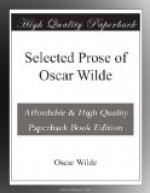and painters have taught them the mysterious loveliness
of such effects. There may have been fogs for
centuries in London. I dare say there were.
But no one saw them, and so we do not know anything
about them. They did not exist till Art had
invented them. Now, it must be admitted, fogs
are carried to excess. They have become the
mere mannerism of a clique, and the exaggerated realism
of their method gives dull people bronchitis.
Where the cultured catch an effect, the uncultured
catch cold. And so, let us be humane, and invite
Art to turn her wonderful eyes elsewhere. She
has done so already, indeed. That white quivering
sunlight that one sees now in France, with its strange
blotches of mauve, and its restless violet shadows,
is her latest fancy, and, on the whole, Nature reproduces
it quite admirably. Where she used to give us
Corots and Daubignys, she gives us now exquisite Monets
and entrancing Pissaros. Indeed there are moments,
rare, it is true, but still to be observed from time
to time, when Nature becomes absolutely modern.
Of course she is not always to be relied upon.
The fact is that she is in this unfortunate position.
Art creates an incomparable and unique effect, and,
having done so, passes on to other things. Nature,
upon the other hand, forgetting that imitation can
be made the sincerest form of insult, keeps on repeating
this effect until we all become absolutely wearied
of it. Nobody of any real culture, for instance,
ever talks nowadays about the beauty of a sunset.
Sunsets are quite old-fashioned. They belong
to the time when Turner was the last note in art.
To admire them is a distinct sign of provincialism
of temperament. Upon the other hand they go on.—
The
Decay of Lying.
AN EXPOSURE OF NATURALISM
After all, what the imitative arts really give us
are merely the various styles of particular artists,
or of certain schools of artists. Surely you
don’t imagine that the people of the Middle Ages
bore any resemblance at all to the figures on mediaeval
stained glass, or in mediaeval stone and wood carving,
or on mediaeval metal-work, or tapestries, or illuminated
MSS. They were probably very ordinary-looking
people, with nothing grotesque, or remarkable, or
fantastic in their appearance. The Middle Ages,
as we know them in art, are simply a definite form
of style, and there is no reason at all why an artist
with this style should not be produced in the nineteenth
century. No great artist ever sees things as
they really are. If he did, he would cease to
be an artist. Take an example from our own day.
I know that you are fond of Japanese things.
Now, do you really imagine that the Japanese people,
as they are presented to us in art, have any existence?
If you do, you have never understood Japanese art
at all. The Japanese people are the deliberate
self-conscious creation of certain individual artists.




